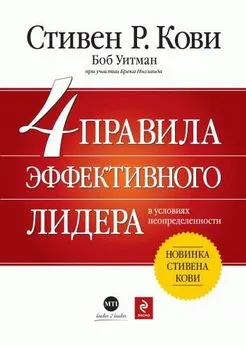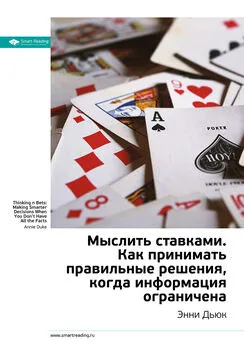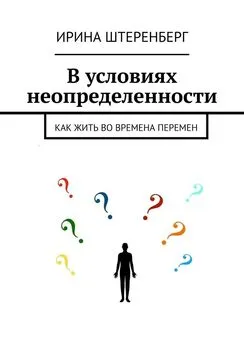Энни Дьюк - Принцип ставок. Как принимать решения в условиях неопределенности
- Название:Принцип ставок. Как принимать решения в условиях неопределенности
- Автор:
- Жанр:
- Издательство:Манн, Иванов и Фербер
- Год:2019
- Город:Москва
- ISBN:978-5-00146-047-3
- Рейтинг:
- Избранное:Добавить в избранное
-
Отзывы:
-
Ваша оценка:
Энни Дьюк - Принцип ставок. Как принимать решения в условиях неопределенности краткое содержание
Энни Дьюк — профессиональный игрок в покер, обладательница браслета Мировой серии покера и бизнес-консультант. Сумма ее призовых составляет несколько миллионов долларов, а среди ее клиентов голливудские звезды и крупные корпорации.
Принцип ставок. Как принимать решения в условиях неопределенности - читать онлайн бесплатно ознакомительный отрывок
Интервал:
Закладка:
Я с признательностью вспоминаю, как мои друзья добросердечно мирились с тем, что книга затянула меня, как черная дыра, и терпеливо ждали моего возвращения. Я не могу даже приблизительно сказать, сколько раз отменяла договоренности. Я никогда не забуду понимание моих друзей и коллег.
Эта книга не увидела бы свет без Эрика. Я благодарю его за терпение и черпаю в нем вдохновение, необходимое во всех сферах жизни. Спасибо моим пасынкам за то, что сделали мою жизнь намного более полной и всегда относятся ко мне с терпением и пониманием.
Родители, брат и сестра стали для меня источником постоянной поддержки. Столь же большое влияние на мою жизнь оказывают мои замечательные, исключительные дети. Они выдерживают жизнь со мной. Они терпели, пока я писала эту книгу. Цель моей жизни — научить их жить, однако невозможно даже представить всё, чему меня научили они. Они потрясающие и вдохновляют меня каждый день.
Литература
Allan, David. «Backcasting to the Future». CNN.com, December 16, 2015. https :// edition . cnn . com /2015/10/22/ health / backcasting - to - the - future / index . html.
Arbesman, Samuel. The Half Life of Facts: Why Everything We Know Has an Expiration Date . New York: Current, 2012.
Ariely, Dan. Predictably Irrational: The Hidden Forces That Shape Our Decisions . Rev. exp. ed. New York: Harper Collins, 2009.
Babcock, Linda, and George Loewenstein. «Explaining Bargaining Impasse: The Role of Self-Serving Biases». Journal of Economic Perspectives 11, no. 1 (Winter 1997): 109–26.
Bailenson, Jeremy, and Laura Carstensen. «Connecting to the Future Self: Using Web-Based Virtual Reality to Increase Retirement Saving». Stanford Freeman Spogli Institute for International Studies, 2009–2011. http://fsi.stanford.edu/research/connecting_to_the_future_self_using_webbased_virtual_reality_to_increase_retirement_saving.
Baumeister, Roy, Jennifer Campbell, Joachim Krueger, and Kathleen Vohs. «Does High Self-Esteem Cause Better Performance, Interpersonal Success, Happiness, or Healthier Lifestyles?» Psychological Science in the Public Interest 4, no. 1 (May 2003): 1–44.
Berra, Yogi, and David Kaplan. You Can Observe a Lot by Watching: What I’ve Learned about Teamwork from the Yankees and Life . Hoboken, NJ: Wiley, 2008.
Bi, Chongzeng, and Daphna Oyserman. «Left Behind or Moving Forward? Effects of Possible Selves and Strategies to Attain Them among Rural Chinese Children». Journal of Adolescence 44 (2015): 245–58.
Boston Public Library. «The 100 Most Influential Books of the Century». TheGreatestBooks.org. http://thegreatestbooks.org/lists/42.
Boyer, Pascal. «Evolutionary Economics of Mental Time Travel?» Trends in Cognitive Sciences 12, no. 6 (June 30, 2008): 219–24.
Brockman, John, ed. Thinking: The New Science of Decision Making, Problem Solving, and Prediction . New York: Harper Perennial, 2013.
Bronowski, Jacob. The Ascent of Man . London: British Broadcasting Corporation, 1973.
Cabane, Olivia Fox. The Charisma Myth: How Anyone Can Master the Art and Science of Personal Magnetism . New York: Portfolio/Penguin, 2012.
Cabane, Olivia Fox, and Judah Pollack. The Net and the Butterfly: The Art and Practice of Breakthrough Thinking . New York: Portfolio/Penguin, 2017.
Cain, Susan. Quiet: The Power of Introverts in a World That Can’t Stop Talking . New York: Crown, 2012.
Camerer, Colin. «Neuroscience, Game Theory, Monkeys». Filmed January 2013, posted on TED.com. https://www.ted.com/talks/colin_camerer_neuroscience_game_theory_monkeys-t-1912.
Campbell, W. Keith, and Constantine Sedikides. «Self-Threat Magnifies the Self-Serving Bias: A Meta-Analytic Integration». Review of General Psychology 3, no. 1 (1999): 23–43.
Cassidy, Joseph. «The Syria Dissent Channel Message Means the System Is Working». Foreign Policy , June 19, 2016. http://foreignpolicy.com/2016/06/19/syria-obama-assad-state-department
Cavagnaro, Daniel, Gabriel Aranovich, Samuel McClure, Mark Pitt, and Jay Myung. «On the Functional Form of Temporal Discounting: An Optimized Adaptive Test». Journal of Risk and Uncertainty 52, no. 3 (June 2016): 233–54.
Chen, M. Keith, Venkat Vakshminarayanan, and Laurie Santos. «How Basic Are Behavioral Biases: Evidence from Capuchin Monkey Trading Behavior». Journal of Political Economy 114, no. 3 (June 2006): 517–37.
Cherones, Tom, dir. Seinfeld . Season 5, Episode 3, «The Glasses». Written by Larry David, Jerry Seinfeld, Tom Gammill, and Max Pross. Aired September 30, 1993, on NBC.
Cialdini, Robert. Influence: The Psychology of Persuasion . Rev. ed. New York: HarperCollins, 2009.
Cowgill, Bo, Justin Wolfers, and Eric Zitzewitz. «Using Prediction Markets to Track Information Flows: Evidence from Google,» January 2009. http://users.nber.org/~jwolfers/papers/GooglePredictionMarketPaper.pdf.
Cowgill, Bo, and Eric Zitzewitz. «Corporate Prediction Markets: Evidence from Google, Ford, and Firm X». Review of Economic Studies 82, no. 4 (April 2, 2015): 1309–41.
Dalio, Ray. Principles: Life and Work . New York: Simon & Schuster, 2017.
Dawkins, Richard. The Greatest Show on Earth: The Evidence for Evolution . New York: Free Press, 2010.
Dawkins, Richard, «Replicators and Vehicles». In Current Problems in Sociobiology , edited by King’s College Sociobiology Group, 45–64. Cambridge: Cambridge University Press, 1982.
Dawkins, Richard. The Selfish Gene . 40th anniv. ed. Oxford: Oxford Landmark Science, 2016. First published 1976 by Oxford University Press (Oxford). Ditto, Peter, Brittany Liu, Cory Clark, Sean Wojcik, Eric Chen, Rebecca Grady, and Joanne Zinger. «At Least Bias Is Bipartisan: A Meta-Analytic Comparison of Partisan Bias in Liberals and Conservatives». April 13, 2017. Available at SSRN: https://ssrn.com/abstract=2952510.
Dreber, Anna, Thomas Pfeiffer, Johan Almenberg, Siri Isaksson, Brad Wilson, Yiling Chen, Brian Nosek, and Magnus Johannesson. «Using Prediction Markets to Estimate the Reproducibility of Scientific Research». Proceedings of the National Academy of Sciences 112, no. 50 (December 2015): 15343–47.
Duarte, Jose, Jarret Crawford, Charlotta Stern, Jonathan Haidt, Lee Jussim, and Philip Tetlock. «Political Diversity Will Improve Social Psychological Science». Behavioral and Brain Sciences 38 (January 2015): 1–58.
Duhigg, Charles. The Power of Habit: Why We Do What We Do in Life and Business . Ed. with new afterword. New York: Random House, 2014.
Duhigg, Charles. Smarter Faster Better: The Secrets of Being Productive in Life and Business . New York: Random House, 2016.
Dyson, George. Turing’s Cathedral: The Origins of the Digital Universe . New York: Pantheon, 2012.
Easterbook, Frank, Circuit Judge. Jentz v. ConAgra Foods, Inc. , 767 F.3d 688 (7th Cir. 2014).
Ellenberg, Jordan. How Not to Be Wrong: The Power of Mathematical Thinking . New York: Penguin, 2014.
Epstein, Lee, Andrew Martin, Jeffrey Segal, and Chad Westerland. «The Judicial Common Space». Journal of Law, Economics, & Organization 23, no. 2 (May 2007): 303–25.
Ersner-Hershfield, Hal, G. Elliott Wimmer, and Brian Knutson. «Saving for the Future Self: Neural Measures of Future Self-Continuity Predict Temporal Discounting». Social Cognitive and Affective Neuroscience 4, no. 1 (2009): 85–92.
Fey, Tina. Bossypants . New York: Reagan Arthur Books, 2011.
Feynman, Richard. «Cargo Cult Science». Engineering and Science 37, no. 7 (June 1974): 10–3.
Feynman, Richard. The Pleasure of Finding Things Out: The Best Short Works of Richard P. Feynman . New York: Perseus Publishing, 1999.
Firestein, Stuart. Ignorance: How It Drives Science . New York: Oxford University Press, 2012.
Firestein, Stuart. «The Pursuit of Ignorance». Filmed February 2013, posted on TED.com. https://www.ted.com/talks/stuart_firestein_the_pursuit_of_ignorance/transcript.
Fischhoff, Baruch. «Hindsight ≠ Foresight: The Effect of Outcome Knowledge on Judgment under Uncertainty». Journal of Experimental Psychology: Human Perception and Performance 1, no. 3 (August 1975): 288–99.
Frederick, Shane, George Loewenstein, and Ted O’Donoghue. «Time Discounting and Time Preference: A Critical Review». Journal of Economic Literature 40, no. 2 (June 2002): 351–401.
Gibney, Alex, dir. Catching Hell . Written by Alex Gibney, produced by Alison Ellwood, Libby Geist, and Matt McDonald. Aired on February 20, 2014, on ESPN. http://www.espn.com/video/clip?id=13883887.
Gilbert, Daniel. «How Mental Systems Believe». American Psychologist 46, no. 2 (February 1991): 107–19.
Gilbert, Daniel. Stumbling on Happiness . New York: Alfred A. Knopf, 2006. Gilbert, Daniel, Romin Tafarodi, and Patrick Malone. «You Can’t Not Believe Everything You Read». Journal of Personality and Social Psychology 65, no. 2 (August 1993): 221–33.
Gino, Francesca. «What We Miss When We Judge a Decision by the Outcome». Harvard Business Review , September 2, 2016. https://hbr.org/2016/09/what-we-miss-when-we-judge-a-decision-by-the-outcome.
Gladwell, Malcolm. Outliers: The Story of Success . New York: Little, Brown, 2008. Goldman, William. Adventures in the Screen Trade: A Personal View of Hollywood and Screenwriting . New York: Warner Books, 1983.
Goldman, William. The Princess Bride: S. Morgenstern’s Classic Tale of True Love and High Adventure — The Good Parts . Boston: Houghton Mifflin Harcourt, 1973.
Goldsmith, Stephen. «Why Dissenting Viewpoints Are Good for Efficiency». Government Technology , July 26, 2016. http://www.govtech.com/opinion/why-dissenting-viewpoints-are-good-for-efficiency.html.
Golman, Russell, David Hagmann, and George Loewenstein. «Information Avoidance». Journal of Economic Literature 55, no. 1 (March 2017): 96–135.
Haidt, Jonathan. The Happiness Hypothesis: Finding Modern Truth in Ancient Wisdom . New York: Basic Books, 2006.
Haidt, Jonathan. The Righteous Mind: Why Good People are Divided by Politics and Religion . New York: Pantheon Books, 2012.
Harford, Tim. «A Beautiful Theory». Forbes , December 10, 2006. http :// www . forbes . com /2006/12/10/ business - game - theory - tech - cx _ th _ games 06_1212 harford . html.
Hastorf, Albert, and Hadley Cantril. «They Saw a Game: A Case Study». Journal of Abnormal and Social Psychology 49, no. 1 (January 1954): 129–34. Haynes, Tara, Raymond Perry, Robert Stupnisky, and Lia Daniels. «A Review of Attributional Retraining Treatments: Fostering Engagement and Persistence in Vulnerable College Students». In Higher Education: Hand book of Theory and Research 24, edited by John Smart, 227–72, Springer Netherlands, 2009.
Читать дальшеИнтервал:
Закладка:










